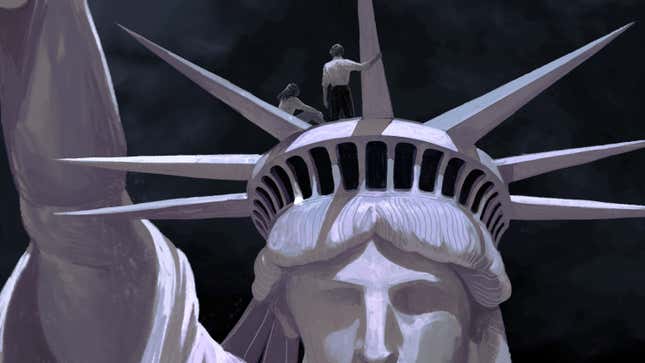
Illustration: Angelica Alzona/GMG
When Joe Biden was declared the winner of the 2020 presidential election in early November, the nationwide reaction was instantaneous, online and off. People poured into the streets to celebrate the end of Trump’s reign, turning street corners into dance parties and car horns into clarion calls of better days ahead. The joy was infectious, cathartic even, for the millions of Americans who languished under the Trump administration’s despotic tenure, especially after his administration’s disjointed efforts to contain the spread of covid-19. But for 25-year-old Sylvia, the mood was far more muted.
“Obviously I didn’t want Trump to be the president at all,” Sylvia told Jezebel during a phone call the week following Biden’s win. “But I don’t feel very happy either.”
Sylvia, whose real name is being withheld due to her status, is just one of America’s 11 million undocumented immigrants and one of the nation’s approximately 800,000 recipients of Deferred Action for Childhood Arrivals. DACA—an Obama-era immigration policy that allowed undocumented immigrants who were brought to the United States as children to delay deportation and receive work permits—was under constant attack during Trump’s tenure. His administration vowed to repeal the measure, and the Trump White House even wrote a memo noting that DACA recipients should prepare to leave the United States, their home.
In the summer of 2018, Jezebel spoke to three DACA recipients amidst this chaos and confusion over the program’s future. Ashleigh from Florida was stuck in status limbo for months thanks to a clerical error and worried about getting deported back to Jamaica; Manny from California was preparing for DACA’s crash and burn; and Sylvia, from Texas, questioned the very logistics of her future in the United States. Now, over two years later, a litany of court battles—including a June 2020 Supreme Court decision—blocked the Trump administration from rescinding DACA, and Trump lost his re-election bid to former Vice President Joe Biden. Following the 2020 general election, Jezebel reached out to Ashleigh, Manny, and Sylvia again to find out how they’ve weathered the pasts two years, and how they might expect their futures to change. They made it clear that their relief toward Trump’s loss came with a caveat: their trepidation toward Biden, whose tenure in the Obama administration is marred by a legacy of mass deportation and whose presidential run was light on bold immigration proposals aside from reversing Trump’s regressive policies.
While the promise of a return to the “normalcy” of the Obama era appeals to many, this vision of calm competence falls flat to those who were most vulnerable to its dysfunction.
“How can we be excited when this is kind of a return to the ineffectual centrism of the Obama years?” Manny asked.
Biden has pledged to restore the DACA program, lift the so-called Muslim Ban, and raise the nation’s cap on refugees. He has nominated Alejandro Mayorkas, a Cuban immigrant who “led the implementation” of DACA in the Obama Administration, to lead the Department of Homeland Security. Yet if the Senate remains under Republican control, many of the items on Biden’s immigration agenda will likely resort to executive actions. And given Biden’s reluctance to propose grand structural changes to the nation’s dysfunctional immigration apparatus, the DACA recipients Jezebel spoke with remain skeptical. They’ve been down this road before: Given a sneak preview of a brighter, more just future for themselves and their families, only to have politics and deportation machines mar the vision. Each apologized profusely, unnecessarily, for their pessimism, but the wariness—the exhaustion—in their voices was palpable.
“Unfortunately, I’m not a very hopeful person,” Ashleigh said. “I used to be, but America has a way of beating the hope out of you.”
-

-

-

-

-

-

-

-

-

-

-

-

-

-

-

-

-

-

-

-

-

-

-

-

-

-

-

-

-

-

-

-

-

-

-

-

-

-

-

-








































